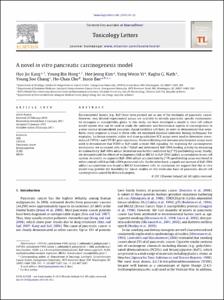KUMEL Repository
1. Journal Papers (연구논문)
1. School of Medicine (의과대학)
Dept. of Internal Medicine (내과학)
A novel in vitro pancreatic carcinogenesis model
- Keimyung Author(s)
- Cho, Ho Chan
- Department
- Dept. of Internal Medicine (내과학)
- Journal Title
- Toxicology Letters
- Issued Date
- 2011
- Volume
- 202
- Issue
- 1
- Keyword
- AhR; CYP1A1; Pancreatic cancer; Benzo(a)pyrene; TCDD; BRCA1
- Abstract
- Environmental factors (e.g., BaP) have been pointed out as one of the etiologies of pancreatic cancer.
However, very limited experimental assays are available to identify pancreatic specific environmen-
tal mutagens or susceptibility genes. In this study, we have developed a simple in vitro cell culture
model system that can be used to study the molecular and biochemical aspects of carcinogenesis in
a near-normal immortalized pancreatic ductal epithelial cell lines. In order to demonstrate that xeno-
biotic stress response is intact in these cells, we employed standard molecular biology techniques. For
examples, luciferase reporter and/or real-time quantitative PCR assays were used to determine stress-
induced CYP1A1 and CYP1B1 gene expression.Western blotting and immunocytochemistry assays were
used to demonstrate that TCDD or BaP could activate AhR signaling. For exploring the carcinogenesis
mechanism, we incubated cells with [3H]BaP and determined BaP–DNA binding activity by measuring
its radioactivity. BaP–DNA adduct formation was further confirmed by [32P]-postlabeling assay. Finally,
we demonstrated the effects of endogenous AhR or BRCA1 in BaP–DNA adduct accumulation in our cell
system. As results, no apparent BaP–DNA adduct accumulation by [32P]-postlabeling assay was found in
either control-siRNA or AhR-siRNA pretreated cells. On the other hand, a significant increase of BaP–DNA
adduct accumulation was found in BRCA1 knockdown cells. In conclusion, we suggest that this in vitro
model may provide the feasibility for future studies on the molecular basis of pancreatic ductal cell
carcinogenesis caused by dietary mutagens.
© 2011 Elsevier Ireland Ltd. All rights reserved. Keywords:
AhR
CYP1A1
Pancreatic cancer
Benzo(a)pyrene
TCDD
BRCA1
- Keimyung Author(s)(Kor)
- 조호찬
- Publisher
- School of Medicine
- Citation
- Hyo Jin Kang et al. (2011). A novel in vitro pancreatic carcinogenesis model. Toxicology Letters, 202(1), 15–22. doi: 10.1016/j.toxlet.2011.01.012
- Type
- Article
- ISSN
- 0378-4274
- Appears in Collections:
- 1. School of Medicine (의과대학) > Dept. of Internal Medicine (내과학)
- 파일 목록
-
-
Download
 oak-aaa-4855.pdf
기타 데이터 / 705.94 kB / Adobe PDF
oak-aaa-4855.pdf
기타 데이터 / 705.94 kB / Adobe PDF
-
Items in Repository are protected by copyright, with all rights reserved, unless otherwise indicated.